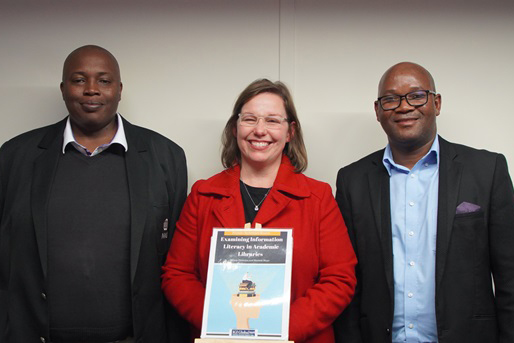NWU Librarians Play Key Role in Advancing Information Literacy
Dr Mathew Moyo, chief director of the Library and Information Service at the Potchefstroom Campus of the North-West University (NWU), and Dr Sabelo Chizwina, director of Information and Learning Services at the Vanderbijlpark Campus, are continuing to expand the NWU’s global footprint.
A book that aspires to exchange knowledge and best practices, particularly in information literacy and related areas, Examining Information Literacy in Academic Libraries (2024), was recently published. It is of value to the library and information service sector and the library and information science field.
The book, published by IGI Global, was edited by Drs Moyo and Chizwina, and it addresses pertinent issues that have a bearing on teaching and learning in the field of information literacy. The book was greatly influenced by the International Conference on Information Literacy (ICIL) – Africa, which is being presented for the third time. It will feature at this year’s conference, which will be hosted by the library of Alexandra in Egypt from 14 to 17 October 2024.
The ICIL – Africa was established by the NWU’s Library and Information Service (LIS), and it is hosted as a sister conference to the European Conference on Information Literacy (ECIL).
The book comprises 14 chapters contributed by authors from around the world who are in practice and academia, and it places more emphasis on interdisciplinary research outreach. Some of the contributors are from universities and civic society, and all seek to bring together knowledge and information. It appeals to a variety of readers such as students, practitioners and policy makers at various levels of an organisation and institution.
Dr Chizwina described editing the book as a journey filled with pitfalls, tribulations and challenges. In his review of the book, Dr Chizwina said: “Information literacy is the cornerstone of most libraries at institutions, since libraries are expected to contribute to the development of information literacy skills for their staff and students. We would like this book to be a resource for other libraries and individuals, and we would also like it to contribute towards the NWU’s research output.”
The development of information literacy skills after the Covid-19 pandemic, the intersection of information literacy and social change in academic libraries, and information literacy in the artificial intelligence sphere are among the concepts discussed in the book.
Dr Moyo emphasised that the book reveals the NWU’s strong commitment to ensuring the students and researchers are all information literate. He said the book also promotes the NWU’s corporate image and contributes to the university’s mission to be an internationally recognised institution.

